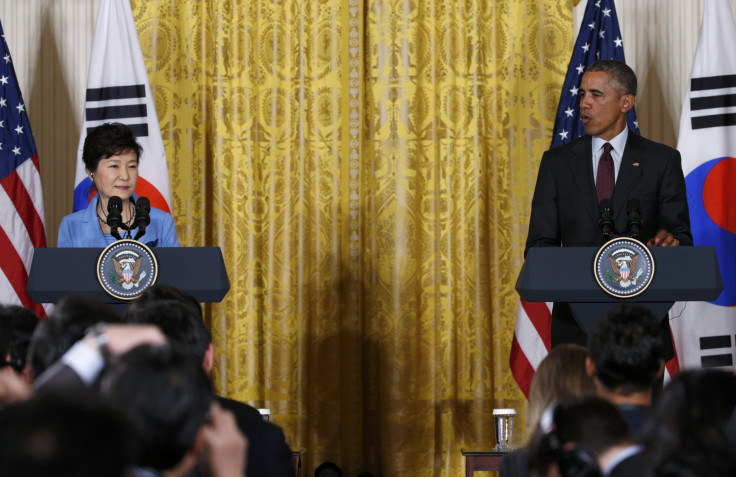US-South Korea Reaffirm Alliance Amid China Slowdown, North Korea Nuclear Threats

United States President Barack Obama said Friday that the country's alliance with South Korea was "stronger than it's ever been" and unaffected by the republic's close ties with China. Speaking at a joint news conference with South Korean President Park Geun-hye, Obama denied any "cracks" in the partnership between the two nations and expressed his hopes that China would join them in pressuring North Korea to denuclearize.
As Beijing -- South Korea's largest trading partner -- struggles through an economic slowdown, Park has carefully maintained her relationship with the U.S. Obama said there was no conflict of interest there. "We want South Korea to have a strong relationship with China just as we want to have a strong relationship with China," he said, adding that "we want to see China's peaceful rise" if it abides by international norms.
All three nations, as well as other major players, like Japan and Russia, have roles to play in de-escalating the tension on the Korean peninsula, Park said Friday. She added that the U.S.-South Korea alliance was a "lynchpin of peace and stability" in the region and improved dialogue between countries could mean a safer Asia.
Obama said he would engage with North Korea if its leaders expressed an honest desire to cooperate and stop developing nuclear weapons. If they indicate they're "interested in seeing relief from sanctions and improved relations and we're prepared to have a serious conversation ... it's fair to say we'll be right there at the table," he said.
Park elaborated with an adage: You can take a horse to the trough, but you can't make it drink water. "North Korea has to come to its own conclusion that it is genuinely willing to give up nuclear capabilities and become a full-fledged member of international society," she said.
The two presidents issued a joint statement earlier in the day restating that they'd never accept Pyongyang as long as it was a nuclear-weapons state. About 28,500 American soldiers remain in South Korea, which Secretary of State John Kerry said last year was a sign that the U.S. was committed to security in the region.
© Copyright IBTimes 2024. All rights reserved.






















